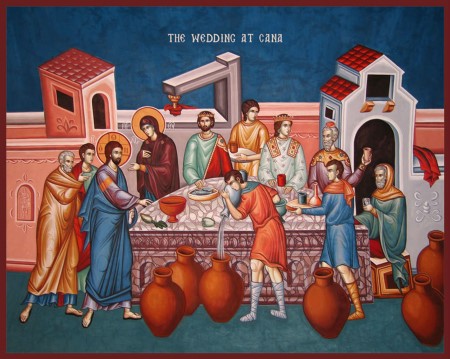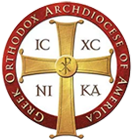Weddings
For the sacramental union of a man and a woman to be proper in the eyes of the Church, the Sacrament of Holy Matrimony must be performed in the Orthodox Church. For such an ecclesiastical marriage to be valid, the following must be adhered to:
1.) No impediment to marriage may exist.
2.) A civil marriage license must be obtained from civil authorities and presented to the parish priest prior to the wedding.
3.) An ecclesiastical marriage license must be obtained from the Diocese Department of Registry authorizing the priest to perform the sacrament.
4.) At least three pre-marital meetings must take place with the parish priest before the wedding.
5.) The sacrament of marriage must be celebrated by an Orthodox priest according to the liturgical tradition of the Church.
6.) The priest must belong to the Greek Orthodox Archdiocese. A marriage performed by a priest of another Orthodox jurisdiction in communion with the Greek Orthodox Archdiocese is also recognized as valid by the Greek Orthodox Archdiocese.
7.) Before requesting permission from the Bishop for the marriage the priest must verify:
a.) that the parties in question are not already married either in this country or elsewhere;
b.) that the party or parties who are members of another parish obtain a certificate of membership from the parish to which they belong;
c.) that if either or both parties are widowed, that he or she present the death certificate of the deceased spouse;
d.) and that if either or both of the parties have been divorced and/or have remarried, whether or not the remarriage was recognized by the Church, that they present the appropriate certificates.
8.) No more than a total of three marriages will be allowed by the Church.
9.) When one or both of the parties are divorced, they must obtain an ecclesiastical divorce as well in order to marry again in the Church.
10.) In the case of a mixed marriage, the non-Orthodox partner must be a Christian who has been baptized in the name of the Holy Trinity. A marriage cannot take place in the Orthodox Church between an Orthodox Christian and a non-Christian.
11.) In the case of mixed marriages between an Orthodox Christian and a non-Orthodox Christian, the marriage must be celebrated by an Orthodox priest in the Orthodox Church according to the Orthodox tradition.
12.) The Sponsor (Koumbaros or Koumbara) must be an Orthodox Christian in good standing with the Church. A person who does not belong to a parish, or who belongs to a parish which is not in communion with the Greek Orthodox Archdiocese, or who if married, is not married in the Orthodox Church cannot be a Sponsor. Non-Orthodox persons may be members of the rest of the wedding party.
13.) Invitations are not to be printed until the date and time are cleared by the parish priest.
14.) If the bride and/or groom have come from Greece after their 16th birthday, they must present, when they apply for their church license, a Certificate of Eligibility for Marriage from the Bishop of their town or province in Greece.
15.) To insure the proper dignity and solemnity of your wedding ceremony, pictures/videos can only be taken if the photographer/videographer speaks with the parish priest at least one half hour prior to the wedding.
16.) Should you desire the services of the church organist, arrangements may be made with the organist by first contacting the Church Office to obtain the names and telephone numbers.
17.) The singing or playing of Orthodox or non-Orthodox hymns and other secular songs before or after the service must be cleared through the parish priest.
18.) If the priest is expected to attend the reception, a formal invitation must be sent as is done in the case of other guests.
19.) If a guest priest is to be invited to participate in the service, it must first be approved of by the parish priest.
20.) If the bride is under 18 years of age, and if the groom is under 21 years of age, a letter of consent from the parents must be presented at the time they apply for the Ecclesiastical Marriage License.
The following are necessary for the ceremony:
1.) Rings for the bride and groom.
2.) Stefana (crowns).
3.) 2 white candles.
Days when marriage is not permitted:
1.) January 5-6
2.) Great Lent and Holy Week
3.) August 1-15
4.) August 29 (Beheading of St. John the Baptist)
5.) September 14 (Elevation of the Holy Cross)
6.) December 13-25
7.) The day before feast days and all Holy Days of our Lord.
NOTE: Exceptions to the above can only be made by special permission of the Bishop of the Metropolis.
Mixed Marriages:
It is a fact that the more things a couple holds in common, the more likely it will be that they live their married lives in peace and harmony. Shared faith and traditions spare the newlyweds and their children many serious problems and strengthen the bonds between them. However, the Orthodox Church blesses inter-faith marriages under the following conditions:
1.) The non-Orthodox partner must be a Christian who has been baptized in the name of the Holy Trinity.
2.) The couple should be willing to baptize their children in the Orthodox Church and nurture them in accordance with the Orthodox Christian Faith.
If these conditions are not met, then the Orthodox Church shall not solemnize the wedding. In such a case it is possible for the couple to marry outside the Orthodox Church. The Orthodox partner, however, should then bear in mind that a married Orthodox Christian whose wedding has not been blessed by the Orthodox Church is no longer in good ecclesiastical standing with the Church and consequently does not have the right to receive the sacraments of the Church, including Holy Communion, or to become a sponsor at an Orthodox wedding, baptism, or chrismation. An Orthodox Christian who has been married outside the Church and who wishes to be reconciled to the Church, is encouraged to request from his or her local Orthodox priest that his or her marriage be blessed in the Orthodox Church.
A non-Orthodox Christian who marries an Orthodox Christian does not automatically become a member of the Church, and is therefore not permitted to receive Holy Communion or other sacraments of the Church or a Church funeral. These are privileges of the baptized or chrismated members of the Church.
Prohibited Marriages:
First Group: Parents with their own children, grandchildren, or great grandchildren.
Second Group: Brothers-in-law with sisters-in-law.
Third Group: Uncles and Aunts with nieces and nephews.
Fourth Group: First cousins with each other.
Fifth Group: Foster parents with foster children or foster children with the children of foster parents.
Sixth Group: Godparents with godchildren or godparents with the parents of godchildren. The child of the godparents with the godchildren. The baptized child with any of the other baptized children of the godparents.
Divorces:
An ecclesiastical divorce may be granted after a civil decree has been given. However, the parish priest must exert every effort to reconcile the couple and avert a divorce. Should the priest fail to bring reconciliation, he will transmit the petition of the party seeking the ecclesiastical divorce to the Spiritual Court of the Diocese. The following items must be submitted by the petitioner along with those required by the parish priest:
1.) An original Church marriage certificate.
2.) A copy of the civil decree of divorce.
3.) A signed petition to the Spiritual Court stating the grounds of divorce.
4.) A money order for the amount payable to the Diocese for processing costs.
5.) The Stewardship Commitment must be met.
These, along with the report of the parish priest on the results of his efforts to reconcile the couple, are then submitted to the Spiritual Court of the Diocese. Upon receipt of the necessary papers, both parties are asked to appear before the Spiritual Court, at a place and date set by the Spiritual Court. Failure to appear may result in the postponement of the hearing. If the Court finds sufficient grounds for divorce it will issue the Ecclesiastical Decree of Divorce.
The only ten valid grounds for an ecclesiastical divorce are:
1.) Evidence of force or coercion to marry, i.e. threat, blackmail, extortion, etc.
2.) Adultery or sexual perversion.
3.) Psychotic tendencies (maniacal tendencies, schizophrenia, etc.).
4.) Acts or threats against the physical well-being or life of the spouse.
5.) Lifetime sentence or incarceration of the spouse for more than seven years.
6.) Leaving the domicile for more than three years without the consent of the spouse, i.e. for purposes of travel, business, etc.
7.) Desertion or abandonment of the domicile by the spouse for more than three years.
8.) Coercing the wife to commit immoral acts of adultery.
9.) Denial of conjugal rights or impotence.
10.) Alcoholism, gambling, or squandering one’s material resources at the expense of the family’s well-being.



